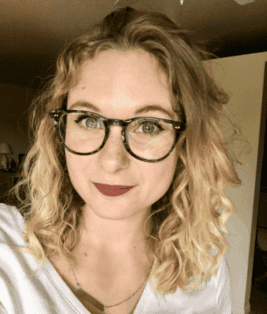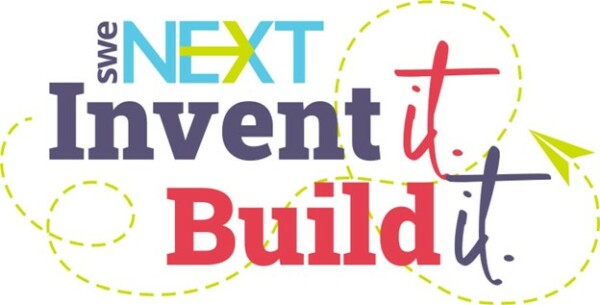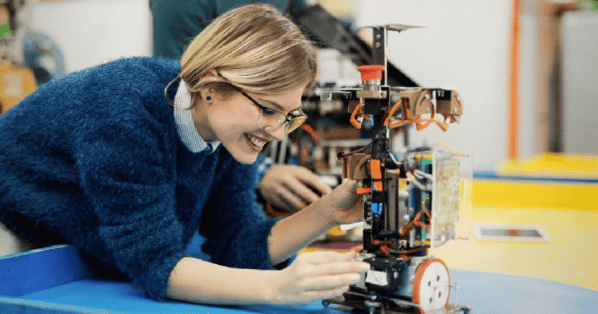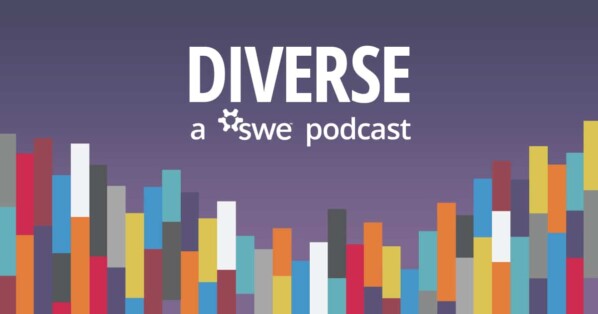By Becca Lasky

I didn’t decide to go into engineering until the week before starting college! I had taken a class in engineering in high school, and I had helped lead a summer program that included STEM outreach. But I just wasn’t sure that’s what I wanted to study in college.
I finally decided on engineering because I knew it was a viable career option, and if I decided to leave engineering later, it would be easy to transfer from engineering into something else. Once I started studying engineering, I found out that I loved it!
What drew me to industrial engineering is how broad it is. It covers many different aspects of work and many different industries. I also liked that it is a lot more business-focused and less “physical design” focused. I like designing systems and that’s what industrial engineers do.
Joining SWE
I received my B.S. in industrial engineering at the University of Pittsburgh. While at Pitt, I joined the Society of Women Engineers (SWE). During my junior year, I was the Meeting Coordinator, which helped me see all the different SWE events taking place. I became the Vice President of the Pitt SWE section my senior year. In addition to other things, I was responsible for SWEvening, where we invited high school seniors accepted by Pitt to come to campus to see what college life is all about. I also helped lead DinnerView, a joint event with other diversity groups in the engineering school. The event was an opportunity to network with industry representatives and practice interviewing for jobs. Now, as a professional, I am still a member of SWE.
Getting a Co-Op
While at Pitt, I also did the Co-Op program. Cooperative Education (Co-op) is the rotation between school and full-time work assignments that relate directly to your discipline. I worked full-time for a term with Bombardier, and then returned to school for full time study for a term, through three different rotations. I ended up working for about a year while in college.
The Co-op experience helped me to decide on specializing in human factors engineering. I am currently working towards a Master of Science (M.S.) degree in human factors with a systems engineering focus from Embry-Riddle Aeronautical University. It’s an on-line program that I can do while still working.
When I graduated from Pitt, I stayed with Bombardier, my co-op company. I work in the Rail Control Solutions group at Bombardier Transportation. We are implementing rail control solutions to update existing rail lines. We also work on automated people movers in airports. And we are working on positive train control systems for the Long Island and Metro North railroads in New York.
Loving my Career
My work changes every single day. I am involved in a lot of early design work, reviewing, analyzing, and providing input to those designs. After the designs are implemented, I do an analysis to assure they are working as intended.
What I love most about my job is that it is never static. It keeps me interested and motivated. And I get to work with different types of people, such as designers, dispatchers, and train operators. There are new challenges all the time. I am never bored!
I have two pieces of advice for girls considering engineering. First, don’t be afraid of change. I know avoiding change can feel “safe”. But change can be exciting, and it keeps things moving. I get bored when I work on the same thing over and over again. When someone tells me, “We’ve always done it this way”, my response is that we can always make it better. The goal is to change, evolve, and get to a better place.
Second, don’t be afraid to ask for help when you need it. Many times you may feel the need to work things out for yourself, instead of getting help. Independence is good, but when you are working in teams with other smart people, asking for help will get you to the final goals faster and better. And that is what working as an engineer is all about.
Author
-

SWE Blog provides up-to-date information and news about the Society and how our members are making a difference every day. You’ll find stories about SWE members, engineering, technology, and other STEM-related topics.






